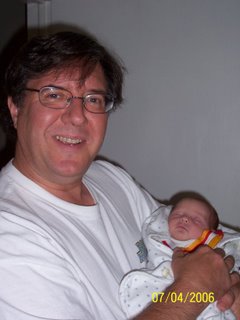Sunday, August 13, 2006
In Memory of Abigail: June 20 - July 7, 2006

The infant cradled in my arms would never know love. She could not cry; could not suffer pain or hunger; could not see or hear.
Two weeks earlier, almost two months ago now, Abigail entered the world with no heartbeat. She did not breathe. Doctors labored heroically to revive her, to no avail. The death certificate was signed.
Then someone noticed her trying to breathe.
Jane and I, not knowing, were on our way to work. Our friend Sunny called "What are you doing?" she asked.
"Going to work," Jane said.
"Pray for my baby."
We headed immediately over to the hospital. Sunny lay in the maternity ER, suffering. The baby's father, J.P., stood close by her side. Family and friends surrounded her.
After some time, the staff wheeled in an incubator on a small cart. Little Abigail, pale and beautiful and still, appeared. She was to be whisked off to Children's Mercy hospital, where she would receive the highest level of care. But she paused in her journey long enough for her mother to touch her. Then Abigail and her attendants left.
Premature separation of the placenta from the wall of the uterus occurs in about one in every 120 pregnancies. In many cases, the baby remains unharmed by a partial separation; even with only half of the placenta working; a sufficient supply of oxygen still passes from the mother to the baby. In Abigail's case, most or the entire placenta tore off the uterine wall without warning, suddenly ripping away for no apparent reason. Starved of oxygen, her brain cells began to fail.
When I visited Abigail a few days later, in the neo-natal intensive care unit, I found the signs of encouragement I wanted to see. She appeared to respond to the sound of my voice. Her tiny hand clasped mine with a firm grip. Despite the disturbing way her eyes rolled around, I took away hope she would improve.
But tests performed a few days after birth confirmed our worst fears. Abigail's brain showed virtually no signs of normal function. The doctors said she would have constant seizures and gave her medicines to mitigate the electrical storms raging in her skull.
Sunny, J.P. and Pastor Jan from St. Paul's arranged for Abigail's baptism into Christianity to be performed at the hospital. And, the Sunday after she was born, in a large room that looked like an OR, surrounded by the love of family and friends, Abigail was baptized.
The following Sunday, she went home with her mother.
Abigail turned two weeks old on the Fourth of July. Family and friends gathered in her mother's home to wish her well. We took turns holding her. As I looked on the perfect, sleeping infant in my arms, I found it difficult to think about her spirit. Though I knew that, with no brain function there would be no mind, I found it hard to believe she was anything less than a whole, perfect human being. Though my own mind told me I held an empty shell, my heart refused to accept it.
No, if her soul had ever been present, it had left before I ever got a chance to hold her.
As human beings, we often confuse wishful thinking with hope. We grab hold of the slightest flimsy excuses to justify our heart's desire, and run with them, telling ourselves our wishes will come true.
We easily fall into the traps of cliche and empty headed repetitions of piety when faced with immediate, personal tragedy. We say "Everything happens for a purpose," and then proceed to construct our own reasons why the conclusion came as it did.
I know Abigail strengthened the bond between her parents. She did the same for Jane and me, and perhaps other friends and family. She reminded me of my own blessings, chief among which are my daughters.
But if that was Abigail's true purpose, the price was too high. The loss outweighed the gain. I can only imagine some of the pain her mother and father feel; at some point, imagination recoils and will go no further.
Here we see the defects of cliched piety. The pain of this suffering cannot be justified by anything we understand. And exactly what do we understand?
I turn to the understanding in the book of Job. I find myself thinking about it a lot. Job, though a righteous man, suffers mightily. He complains to his friends at length, and finally, to God. His complaints are well founded. But God does not justify His actions. He responds to Job in some of the most poetic language of the Bible: "Where were you when I laid the earth's foundation? Tell me, if you understand." (Job 38:4)
Well, this answer is no answer. It explains nothing. God is God and we are not. God understands what He understands, and we do not. God does not justify Himself to us.
Even with limited human understanding, we can replace wishful thinking with genuine hope. We can face the real world, as it actually is, with clear eyes, and a calm and steady gaze. Sunny and J.P. endure, and in the midst of tragedy, they make plans for the future.
Abigail died at home Friday, July 7th.
On a very stormy Tuesday evening, July 11th, over eighty, perhaps over a hundred people came to visit Abigail and her family. As we drove to the funeral home, a rainbow struggled to appear in the East.
Led by Pastor Jan, we prayed together, commending the spirit of the infant to God.
Abigail lay by herself in a small room, away from the crowd of friends and family gathered in the larger room nearby. She looked pale and peaceful. She wore a white crotched cap and dress; beads around her neck strung together just for her; a grandfather's rosary at her feet. Ever so gently, I touched her tiny hand. Then we left.
As we drove away, rainbows stretched across the sky, under torn curtains of black and gray clouds. The rainbows reminded all of us of God's promises of renewal and hope. I, for one, could think about little else.
Every normal human being shares a heritage with his or her fellows. We occupy the time between birth and death with hopeful activities, striving to fully realize the promises within each of us. Our maker built us just so, giving us certain needs. We observe the same details of our nature whether or not we credit God, evolution or God-guided evolution with our design.
We never exist alone. We live in community. This is how we are made.
Our communities lift us up; they sustain us. Our families and friends share our joys thereby multiplying them. When we share our grief, it divides.
I also believe we find the greatest happiness and serenity when we embrace faith in God. When we choose to trust God, we find courage to endure the suffering that life inflicts on us. We do more than merely endure; we rise up out of the ashes with hope. This is how we are made.
Fluffy white clouds drifted in blue Midwest skies on the day of the funeral; the air purified by the rampaging thunderstorms of the night before. The tiny pastel casket came to rest on a grassy hill; bells rang in the distance.
Towards the end of the service, individuals took one of several dozen balloons and walked to an open space. As they handed out the balloons, a single green one escaped. It climbed quickly out of sight. A minute later, three dozen or so pink, green, white and yellow balloons took off together.
I could not help but think about April 19, 2005. Then, with a mere handful of friends, I released a balloon into the air in memory of children taken too soon. This time, I just watched.
The human condition requires us to know grief. Sooner or later, each and every one of us faces irrevocable loss. But our endowment includes the capacity to choose our response to grief. We can allow ourselves to fully experience it, and then to move on. Or we can make a vain attempt to avoid it. This is how we are made.
The weight of our burdens lightens when we choose to share them with God. This is how we are made.
Many people choose not to believe in God, choose to deny Him and therefore cannot trust in Him. They require external proof, as if it makes sense to require proof of the transcendent. By their understanding, that is the wiser path. But what a lonely, empty path; everything reduced to matter and matter in motion. Is this how we are made?
The choice, really, is one of choosing how to live. One can seek to live only by philosophically, logically justified beliefs, or not. To me, the choice is between an ultimately sterile, barren, meaningless existence; or a life worth living.
Whatever other purposes the life of Abigail served, she challenged us to hold on to our faith. She teaches us about hope, and about God. She shows us the way. This is how we are made.
Comments:
<< Home
Visit My Current Blog!
Thank you Mike, for sharing my daughter with the world. She means everything to her father and I, even if she was only here for a small amout of time. She did feel love and that was proven when it was her time to pass, as she came back after her breathing had stopped for over 6 minutes when I entered the room. She passed a short time later with me at her side. Thank you to everyone who reads this and takes away a small amout of pain and hope at the same time. God Bless you all.
Sunny Davis
Sunny Davis
Hi, Mike.
I just reread this tribute to Abigail. It is still as wonderful as it was the first time I read it.
Thank you so very much for having this blog. I enjoy it immensely!
Post a Comment
I just reread this tribute to Abigail. It is still as wonderful as it was the first time I read it.
Thank you so very much for having this blog. I enjoy it immensely!
<< Home


